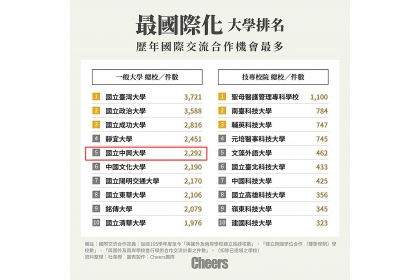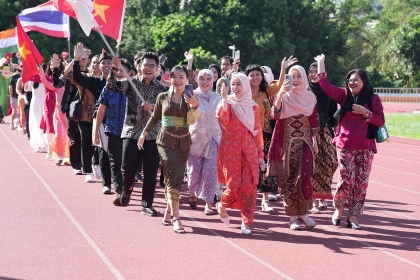NCHU Ranks Fifth in Taiwan for Internationalization
2025-03-24
興新聞張貼者
Unit秘書室
2,511
Cheers magazine recently released its ranking of the "Most Internationalized Universities in Taiwan," where National Chung Hsing University (NCHU) secured the fifth spot. NCHU excelled in three key internationalization indicators: the number of dual-degree programs, the number of partner institutions, and the volume of academic exchange activities. The university currently has 430 partner schools, with 120 offering student exchange opportunities. Additionally, NCHU has established dual-degree programs with 37 prestigious international universities, providing students with diverse opportunities for global academic exchange.
NCHU has been actively expanding its international academic collaborations. In the past two years, it has signed new agreements with several universities with notable globally ranking, including the University of New South Wales in Australia (QS World University Ranking: 19), Leiden University College The Hague in the Netherlands (Rank: 141), Keio University in Japan (Rank: 188), Dresden University of Technology in Germany (Rank: 234), and the University of Tasmania in Australia (Rank: 293).
The university offers 37 dual-degree programs that enable students to earn degrees from both NCHU and partner institutions abroad. These programs not only allow NCHU students to study overseas but also provide international students the opportunity to pursue part of their studies in Taiwan. A standout example is the veterinary medicine dual-degree program, developed in collaboration with Kansas State University and Iowa State University in the United States. Since its launch in 2017, the program has successfully guided students toward earning U.S. veterinary licenses. Another long-standing partnership is with Toyota Technological Institute in Japan. Since 2007, 82 students from NCHU’s College of Engineering and College of Electrical Engineering and Computer Science have conducted research there as part of ongoing academic exchange. The proportion of students joining dual-degree programs rose by nearly 64% from 2017 to 2023, reflecting a strong upward trend in international academic engagement. Each year, a growing number of outstanding students from partner institutions in Europe and the U.S. also choose to study at NCHU, further enhancing cross-border academic exchange and collaboration.
The increasingly popular "3+X" degree program enables students to complete three years of undergraduate studies at NCHU before continuing at a partner university abroad to earn both a bachelor's and a master's degree. Current partner institutions include the University of California, Davis (UC Davis) and Utah State University in the U.S. The UC Davis collaboration covers a wide range of disciplines at NCHU, including Applied Economics, Agribusiness, Plant Pathology, Life Sciences, Biotechnology, Horticulture, Agronomy, Electrical Engineering, Civil Engineering, Environmental Engineering, and Computer Science, offering students extensive international academic pathways.
NCHU Vice President for International Affairs, Dr. Chi-Chung Chou, emphasized the university's commitment to advancing its internationalization through a broad range of strategic initiatives. Moving forward, NCHU aims to further diversify its dual-degree offerings, establish international research teams, expand academic collaborations, and launch global projects, including Mandarin language programs and summer schools. These efforts are designed to cultivate professionals with a global perspective and strong international competitiveness.
NCHU has been actively expanding its international academic collaborations. In the past two years, it has signed new agreements with several universities with notable globally ranking, including the University of New South Wales in Australia (QS World University Ranking: 19), Leiden University College The Hague in the Netherlands (Rank: 141), Keio University in Japan (Rank: 188), Dresden University of Technology in Germany (Rank: 234), and the University of Tasmania in Australia (Rank: 293).
The university offers 37 dual-degree programs that enable students to earn degrees from both NCHU and partner institutions abroad. These programs not only allow NCHU students to study overseas but also provide international students the opportunity to pursue part of their studies in Taiwan. A standout example is the veterinary medicine dual-degree program, developed in collaboration with Kansas State University and Iowa State University in the United States. Since its launch in 2017, the program has successfully guided students toward earning U.S. veterinary licenses. Another long-standing partnership is with Toyota Technological Institute in Japan. Since 2007, 82 students from NCHU’s College of Engineering and College of Electrical Engineering and Computer Science have conducted research there as part of ongoing academic exchange. The proportion of students joining dual-degree programs rose by nearly 64% from 2017 to 2023, reflecting a strong upward trend in international academic engagement. Each year, a growing number of outstanding students from partner institutions in Europe and the U.S. also choose to study at NCHU, further enhancing cross-border academic exchange and collaboration.
The increasingly popular "3+X" degree program enables students to complete three years of undergraduate studies at NCHU before continuing at a partner university abroad to earn both a bachelor's and a master's degree. Current partner institutions include the University of California, Davis (UC Davis) and Utah State University in the U.S. The UC Davis collaboration covers a wide range of disciplines at NCHU, including Applied Economics, Agribusiness, Plant Pathology, Life Sciences, Biotechnology, Horticulture, Agronomy, Electrical Engineering, Civil Engineering, Environmental Engineering, and Computer Science, offering students extensive international academic pathways.
NCHU Vice President for International Affairs, Dr. Chi-Chung Chou, emphasized the university's commitment to advancing its internationalization through a broad range of strategic initiatives. Moving forward, NCHU aims to further diversify its dual-degree offerings, establish international research teams, expand academic collaborations, and launch global projects, including Mandarin language programs and summer schools. These efforts are designed to cultivate professionals with a global perspective and strong international competitiveness.



